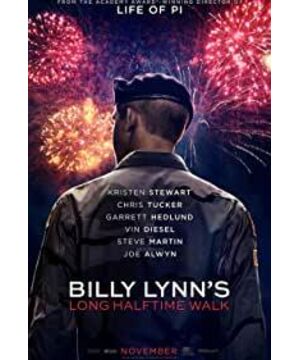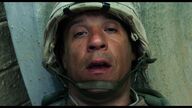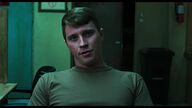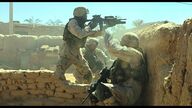The following text:
After watching the movie at NYFF, I also unexpectedly received an experience from Director Ang Lee before the show, which is really worth it hhh. I feel that I have a lot of feelings and I want to say a lot of grooves to vomit. Just write your own opinions.
Before watching Billy Lynn, the first media commentary was over. There should be a comment, and I searched for critics. I put it together and counted the majority for the sake of fairness. I got two pieces of information: 1. Watching this movie is like watching HDTV. ; Second, the best word of reviews is "mixed".
I'm surprised and confused: what's wrong? And is there really a problem?
However, after reading it, I deeply feel that there is really no evaluation more in one sentence than this. Because my personal most intuitive feeling is also these two points. The only thing I misjudged was that these two reviews didn't actually mean that the movie was a mess. In other words, it is difficult to judge whether this movie is good or not. It has amazing flaws and amazing advantages at the same time. The biggest feeling that brought me the most is actually the impact of the huge conflict between the two. And this may be the commonality of most works that try new technologies for the first time: in the immature exploration, the first thing to be noticed is the defect, and then it is possible to discuss whether the applied technology has prospects and whether it is necessary to continue. The experiment continues, if there is a potential for how other departments should cooperate with innovation, what kind of situation to use this technology is more appropriate.
My whole experience of watching the movie is actually divided into two stages, with Lynn's half time walk as the dividing line.
In the first stage, Lynn was invited to the football game when he came back from the front line and was invited to go to the football game. The publicity activities he saw and heard on the way, interspersed with the battlefield training process and several memories of family life after returning.
From the very first shot, there was a feeling that something was wrong. Think about it, it is indeed the feeling of watching HDTV: you can't tell what is wrong, but it is true that what you see on the camera is different from the familiar scene in your eyes. In order to confirm this fact, I also compared the actions of the characters with the small actions of the audience in front of them. . . Really noticeably different. It is indeed the so-called hyperreal: every detail is very clear, so clear that the background actors behind the scenes can see every move clearly, as if there is no such thing as focal length, and even if the actors move quickly, there is no blur. However, this is precisely the fatal flaw: what we see with our eyes is not so. The ability of the eyes is greatly improved, and the result is countless distractions: attention is attracted by those places that are different from usual, resulting in the main plot that should really be paid attention to. Incidentally: when the buffer came out in front of me, it was no longer distraction. I was so deeply attracted that I didn’t pay attention to what the main line was doing. = =
There is also a very obvious experience, that is, once the camera moves, I It must be realized: this is looking at the world through a lens. Intuitively, it was as if there was a square black tube in front of me, which kept me from entering the plot. After analysis, I understood where the problem was: what the human eye sees, the edge range is blurred. And 120fps photography makes the whole picture extremely clear, and the contrast at the edges is infinitely magnified. Usually, when the eyes are moving, it is a process in which the subject becomes blurred and the edge objects are gradually clear, so the lens is not moving. I also get motion sickness when the camera pans fast. . .
The above findings led me to think about two questions: First, how should actors perform in this way of filming. I couldn't help but notice that the "realness" of the actions of the different actors in the shot varies greatly under such a shot. Some actors' body movements look very fake. How should I put it, they are watching the performance from a blooper perspective. . . And some actors look similar to normal movies, which is acceptable. There are also actors who let me see their acting skills, yes, I am talking about Kristen Stewart. . . KStew fans don't hit me. . . Just kidding, in fact, KStew still has acting skills, but I always feel that her way of acting is a bit too "accepting" (this may have a personal preference filter). But under the lens of this film, KStew's performance is very real and moving, especially when compared with the rest of the actors. I think it may be because of the "magnification" of the action during high-speed photography, so the body language of the actors who were originally exaggerated appears more exaggerated, creating a sense of artificiality, while the action of the introverted and slightly flat will be magnified to the point where it is just right. Think about it again, it may be similar to the relationship between the stage->TV->movie lens angle of view, but the last link of the chain is now a 120fps movie. If this shooting technique is really used, will the actors' performance habits also change accordingly? In other words, are you looking for an actor with a suitable acting style?
Second, the problem of the "black hole" of the lens. . . While watching the movie, I was thinking, if this movie is not a flat screen, but a curved giant screen, the effect is not sure how many times better. A feature of the curved screen is that the human eye will have a blurring effect at the edge, and it is estimated that the effect will be more realistic. And there is a sense of surround and the huge and clear scene in front of you, it is estimated that the effect will be extremely shocking. Well, it's actually VR. . .
Looking back and talking about the first half, I feel that I have no way to reasonably evaluate the plot. Among these distractions, the plot seems to fall flat, but there is no way to know if the plot is really flat? Or is it just because I didn't get into the show that I felt that way? Maybe the plot looks good in the usual way of shooting. So let's not talk about that.
When I think about it, I will add one more point: a lot of places where mirrors are cut are simply pits! In particular, a few faded out, as if PPT changed pages, I was really impressed. . . Thinking about why, it seems that the image is too clear. The picture is not blurred enough, so the faces are faded and the outlines are clearly reflected on the screen. I can't complain. When I watched it, I was angrily thinking why I didn't kick the camera and edit it for a different person. After thinking about it carefully, no one was familiar with the new technology, and these problems were inevitable.
To sum up, the first stage is basically: the barrage is constantly flying in my mind, and at the same time I am still trying to concentrate on watching the plot. . . It's just dying.
The second half of the second half. After watching this part, my whole person is completely different, and my opinion of this movie is completely different from the previous half. Yes, it is completely different. This part, I personally think, is the key, the most important kind of weight.
The change in my perception of the film began the moment Lynn stepped down the steps. A cross-cut, the fireworks were chaotic to the battlefield, the chaotic drum beats were interspersed with gunshots, and the cheering audience was mixed with the roars of the battlefield, and I stayed on the spot. To be honest, I can’t remember completely and I can’t remember the concrete or abstract scenes interspersed in the concrete, but I really remember being filled with all kinds of sound and light information that suddenly poured in, so that when I reacted, I found myself Like the protagonist, his hands are shaking with a sense of panic and powerlessness. To take an inappropriate analogy is to be overwhelmed by being submerged in water. Before this, I had never imagined any way to visualize PTSD so that people who have never experienced it could experience this feeling. Ang Lee did it. Although I haven't experienced it, and I don't know if this feeling is accurate, but I can't forget this feeling at least for a while.
The latter part of the battlefield is completely full of fire, which vividly shows the shocking advantages of 120fps photography. This is what I think is the climax of the whole movie. I even thought that Ang Lee made this movie probably for this part. In the cluttered, fast-moving scenes, the realism of war scenes comes within reach. In the part where I kill the enemy with my bare hands, I feel like I'm not watching a movie, I'm just watching and witnessing a murder. Especially in the process of life and death, the gradual changes in the facial expressions of the two people, I think I will probably never forget the distance between life and death that is so clearly and so coldly and nakedly displayed (although it is played) in my life. , and such a violent shock to one's psyche in those brief minutes. Some commented that the movie looked distant and not as advertised as Intimate, I don't think so. I thought that what Ang Lee was after was precisely in this brief time and space that was so clear and precise that it gave people a sense of distance, in these few minutes, in this section of the cement pipe, in the process of two people tearing and scrambling to see clearly In the case of Chu, let you experience the biggest impact you can psychologically experience through this ridiculous distance. This is the so-called Intimate, not a sense of distance, but a sense of impact. This time, from far to near, shatters the previously ridiculous world, and suddenly you are exposed to this incomparably real world, with nowhere to hide and nowhere to go. I was really shocked. Linking to the previous part, I suddenly felt that the sense of absurdity, the sense of absurdity, the sense of being unable to connect with the world is actually the feeling of the protagonist Lynn returning to the "normal" world. I can't tell if it's intentional or slanted, but the parts that seem to be flaws in the movie just provide me with an emotional experience that fits the plot. For a while, I could see why Lynn wanted to get back on the field. It's not because of these, it's just because, only on the battlefield he can feel the truth, the fear of life, the fragility, helplessness, mystery and preciousness, only on the battlefield, in the comrades in arms, in the emotional barrier between life and death, He can connect with the world. When I felt that, I felt that this movie did something that other movies didn't do: it was immersive and emotional.
I don't know if this is what the director wanted to express, or if it's just my personal feeling. After reading some comments, it seems that no one feels the same as I do, they are all saying that this is just a technical attempt, not a successful work. I don't know if the Easterners are more sensitive and more able to experience the emotional changes inside. It is hard to say that it was a crooked attack. The impact of technology fits the emotional theme that the film wants to express, or it is the director's careful arrangement, which brings a unique viewing experience. But it just proves that everyone has different tastes and feelings about movies. After watching the movie, I gained something and walked out of the theater door with new thinking. I think it is worth the ticket price.
In short, after watching the movie, it is indeed a mixed taste. If I only talked about the first half, I would put this movie in the ranks of experimental movies + commercial bad movies, but after watching the second half, this movie added to my not only the most unique movie viewing experience, but also the most unique physical and emotional experience. film ranks. As a non-professional movie fan, I can't predict whether 120fps is another technological revolution, or just a fresh but impractical attempt. However, on the long film road, so many new and old alternate, ups and downs, who can say Exactly.
One more word on the topic. After watching the movie, I want to shoot some war documentaries, musicals, and sports movies with high-speed photography. Then there are more close-ups, and the details of the facial changes shown are breathtaking (although the shots are also very unmerciful... Ang Lee himself said that it is not easy for actors to make up). Then there is the fact that high-speed photography seems to be eye-catching, and my eyelids have been twitching on the way home. . . .
After writing so much, in fact, I am an unprofessional movie fan at all. . . I really want to discuss with Director Ang Lee how to improve these problems. However, the director went home and went to sleep after speaking before the opening. Can anyone show these problems to Director Lee. . . Anyway, it's always good to watch a movie for some inspiration. Regardless of whether the opinion is correct or not, I am very satisfied with my own thinking. -
==================================
After reading some reviews, I added some thoughts: In fact, many of Ang Lee's films have a fatal flaw, and the plot is not enough to catch people. It's a matter of narrative pacing. Brokeback Mountain was overshadowed by deep emotions, Young Pi was overshadowed by magnificent visual effects, and when it came to Billy Lynn, once there were no other highlights, this flaw became extremely obvious. In fact, my favorite is the wedding banquet. In my opinion, Ang Lee is the most suitable for this style and theme. But as a director, what is the difference between not breaking through yourself and being a salted fish? so. . . I still hope that Director Li can catch his weak point. Although it is required to be new, it is also very important to have no shortcomings.
=================================
UPDATE 10/17:
First to correct a memory error in an earlier review: lots of cross-cuts Appears near the end of the film, not in the middle. Although the Half Time Walk also has the montage of the show and the battlefield, it is not as long as the number at the end.
Today I went to the second brush, the most obvious feeling is that I got used to the lens a little and I can play. On the basis of entering the play, the plot is much clearer, so let's talk about the plot below.
Personal opinion, the whole movie is expressing a somewhat cynical, a little anti-theme theme: for the "War Hero" "Bravo" Eight, the real battlefield is in a small society in the Texas football game, and back to the far away The battlefield in Iraq was like coming home. Under the scrutinizing eyes of the public, they need to fight against everyone, struggle through everything back home, yet in Iraq they got each other's back as an unbreakable team when they are forced to face the looming death.
And the display of this theme, also It unfolds in the characterization of each representative group.
First up is Billy Lynn's family. A quarrel at the dinner table shows the conflict in the family: not just the conflict of political opinions, but also the conflict of the various family members' feelings towards Billy - a label of "hero" breaks the balance in the family. Although the family loved Billy dearly, the closeness based on equality no longer existed. This is even more salient compared to the later conversation between Billy and sister Kathryn.
Then there are ordinary people. In the stands, the audience came to Billy to express their pride, admiration or gratitude. The camera rolls back, and Billy's polite, blank face is reflected on the screen. For the people, these soldiers are symbols of heroes, and their congratulations are also out of kindness and sincerity. Yet all this is too far for Billy: he doesn't know these strangers, they mean nothing to him, and they don't know him beyond an abstract symbol drawn by the media.
There is also a group of football players, various media, and a team of cheerleaders. In the locker room, a few athletes half-curiously, half-spyingly asked Billy what it was like to kill. During media interviews, Billy made up his mind to answer questions with real answers that could not be used on the table instead of casual Mandarin. Faison, Billy's love at first sight, only seems to have Billy as a trophy boyfriend, and while she does care about Billy, standing up for the dignity of the soldiers and groundskeepers when they clash, that's not all. At the end of the film, when Billy half-jokingly and half-seriously said how about we run away, Faison looked like you are not serious, I think Billy in her heart is probably a hero who sacrificed for the country, and she herself and the hero Admiration for each other, willing to sacrifice love for the hero to continue to serve the country.
Compared with these harmless characters, there are others who seem to be more indifferent: the boss of a new energy company pretends to test the situation at a luncheon to speculate on business information; the organizers of the halftime show put They are manipulated as eye-catching mascots; a little brother treats the army as a big fat saucy gay joke; the team owner drives down the contract price of the film adaptation for maximum profit. In the eyes of these people, it doesn't matter whether they are a team of real flesh and blood, as long as it is profitable.
It seemed like only Billy's sister Kathryn really cared about him and understood his needs. Aside from his comrades, Kathryn was the only person Billy could be inappropriate in her presence. She was the only one who saw the hidden problems behind Billy's experience and asked him not to return to the battlefield.
In a situation like this, it's hard for me to imagine Billy Lynn without a sense of alienation from society: no one here knows what war really looks like like he does. War is commercialized, and so is the warrior as the closest channel to war. Everyone wants to get close to him, hope to get fresh information, or get some benefits from him. On this "battlefield", Billy has to face countless pairs of eyes peeping into all parts of his inner and outer appearance, coming from all directions. He was exposed to the spotlight of the public eye, but at the same time no part of his true self was understood or accepted. The team owner was right: It won't be long before the public loses interest in "Bravo." Their value in this society is nothing but these, and there is no place to live after they are used up. And what Sergeant Dime said was even more helpless, nothing was right and nothing was wrong. Society is like this. Everyone's social identity determines his position and ideas. All the people in front are in their respective positions, and they should make those actions. And these soldiers are just a few small people in this society. Their lives and their futures are still controlled by the decisions of the upper class. So in the end, Billy's choice at the end of the film doesn't really qualify as a choice: there is no place for him in this society, and he has nowhere to go except on the battlefield.
But Billy's choice to return to the battlefield is not a helpless one. Billy said we were building schools in Iraq and building drainage, but Iraqis just hated us. In the end, there is nothing else to ask for but to survive. There are not so many sacred reasons in life: Billy went to war not for the selfless dedication of the country, but because he destroyed the car of his sister jerk's fiancé, and had to enlist in order not to go to jail; Billy's ability to grab a comrade-in-arms in the hail of bullets is not a heroic power, It's just a natural and subconscious operation after training; Billy killed his opponent in the fight not for the sake of national justice, or even to avenge his comrades, but because the enemy just rushed over, and if he didn't start, he would have died a long time ago. Look at the Iraqi family again, because of a series of unfortunate coincidences, it is no longer possible to live in peace. Everything is insane. For those who have experienced it, it is a long nerve wracking nightmare, a tragedy that no one has the ability to reverse after everything went wrong. On the battlefield, everything is down to earth: the lives of eight people are in each other's hands. Taking on one's death is too heavy to take on any more. Billy's comrades need him the most, and only returning to the battlefield and facing life and death with his comrades is the right choice to make him feel at ease.
So in the end, when the comrades said "Before they kill us, take us someplace safe. Take us back to the war.", when Billy Lynn said "I love you", the comrades answered "I love you" one by one , In fact, the comic tone that should be there is gone. Instead, after a long halftime show, the sincerity shared between a group of people on the brink of life and death.
After watching the plot, I discovered the mistake I made in my superficial understanding: some of the reviews said the movie looked "distant", which is actually justified. Only I'll change the word: "convincing". All of the above, in order to convert into a convincing and touching film language, need to be polished in many details. And the movie doesn't do that. There is always a feeling that there is a little bit of interest everywhere, but nowhere to express the feeling of full meaning. Half of this problem can be attributed to the picture, but the other half is the problem of narrative editing. I think the movie may have copied the model of the novel. However, even if the novel has a flat structure, the charm of the language will fill the gap. In the movie, the details are not full enough, and the theme will not hold up.
But as director Ang Lee said, give it a chance. This opportunity can be reserved for new shooting methods, and the narrative problems cannot be forgiven more.
View more about Billy Lynn's Long Halftime Walk reviews











